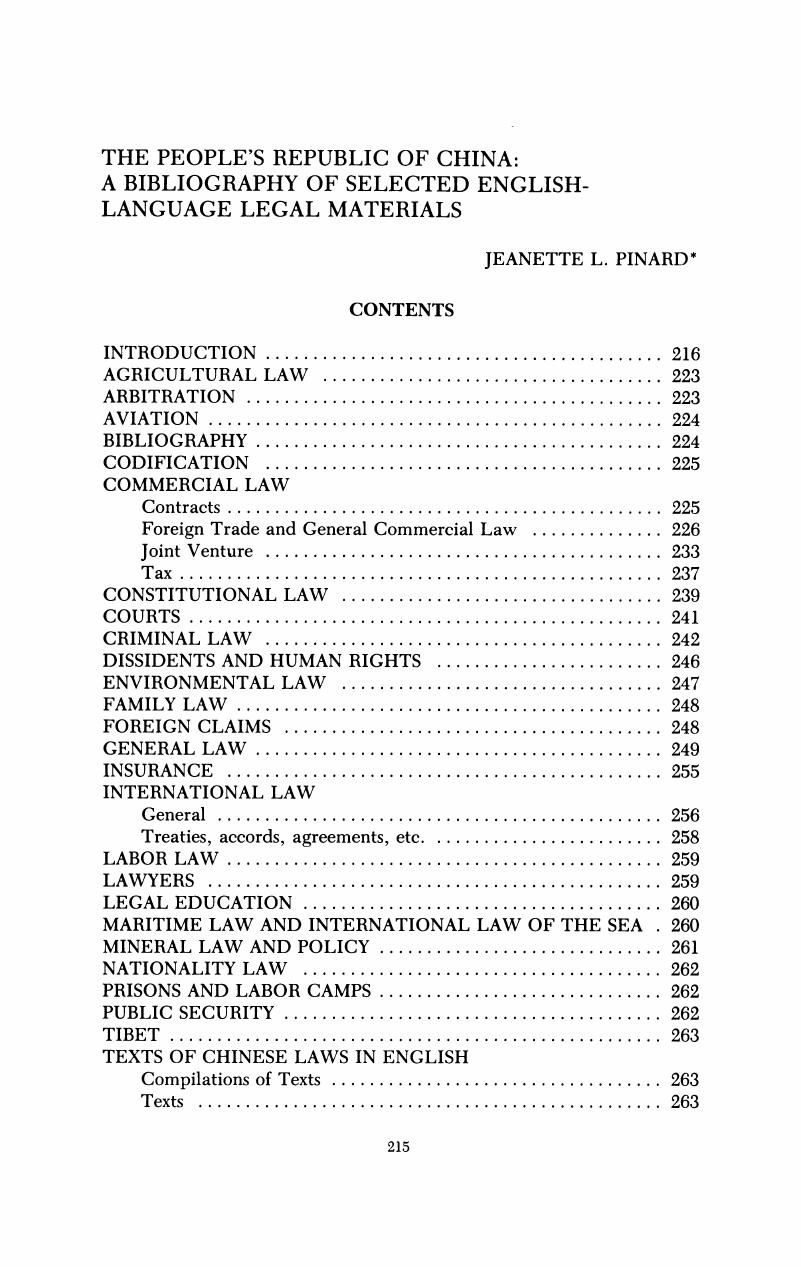Article contents
The People's Republic of China: A Bibliography of Selected English-Language Legal Materials
Published online by Cambridge University Press: 28 February 2019
Abstract

- Type
- Bibliography
- Information
- Copyright
- Copyright © 1983 by International Association of Law Libraries
References
1. “Communique of the Third Plenary Session of the Eleventh Central Committee of the Communist Party of China,” 21:52 Beijing Review 14 (December 1978).Google Scholar
2. Yu-Yu, Cheng and Shu-Wen, Wang eds., Fa Hsueh Chi Pen Chih Shih Chiang Hua 141 (Peking, Kuo Ch'ing Nien Ch'u Pan She, 1980).Google Scholar
3. The People's Daily (Peking), August 24, 1982, p. 3.Google Scholar
4. Hsin, Chang, “Enforcement of Policies and Enforcement of Laws” translated in FBIS, Daily Report: People';s Republic of China, November 14, 1979, no. 221, p. L-2.Google Scholar
5. “There is a formal procedure for superceding the Constitution.” China Report: Political, Sociological and Military Affairs, no. 358, 33 (November 8, 1982). “It is … permissible for the National People's Congress to make a decision to temporarily suspend the application of certain provisions in the Constitution by invoking the principle of ‘new statutes superceding previous ones.'” Supra note 4, at L2-4.Google Scholar
6. Ch'en Ch'un-lung and Hsiao Hsien-fu eds., Fa Hsueh T'ung Lun 44-45 (Chi Lin, Jen Min Ch'u Pan She, 1981).Google Scholar
7. Blaustein, A. P., ed., Fundamental Legal Documents of Commnist China xv (1962).Google Scholar
8. Supra note 6, at 44-45.Google Scholar
9. T'ien-yu, Liu, “T'an ‘Yi Fa Ts'ung Chung Ts'ung K'uai’ yu Tso Ch'ing Ts'o Wu te Chieh Hsien” 4 Fa Hsueh Yueh K'an 24 (April 1982).Google Scholar
10. Supra note 6, at 44-45.Google Scholar
11. Id.Google Scholar
12. Foster, F. H., “Codification in Post-Mao china,” 30 Am.J.Comp.L. 400 (1982).CrossRefGoogle Scholar
13. Id.Google Scholar
14. Constitution of the People's Republic of China [1982], Art. 67.Google Scholar
15. FBIS, Daily Report: China, December 9, 1982, no. 237, p. K-1.Google Scholar
16. Constitution [1982], Art. 62.Google Scholar
17. Id., Art. 67.Google Scholar
18. Ch'en Ch'un-lung, et al., eds., Fa Lu Chih Shih Wen Ta 9 (Peking, Peiching Ch'u Pan She, 1979).Google Scholar
19. Id. See also supra note 6, at 25.Google Scholar
20. Supra note 4.Google Scholar
21. Organic Law of the People's Courts of the PRC, art 11.Google Scholar
22. Supra note 6, at 27.Google Scholar
23. This information was confirmed by Professor Chang Chin-fan of the Department of Law, People's University of Peking, during his recent visit to the Library of Congress.Google Scholar
24. Fa ling are described in several Chinese legal publications as those laws and regulations enacted by the Standing Committee of the NPC; see supra note 18, at 10 and Fa Hsueh T'se Tian 454 (Shanghai, Shanghai Shih Shu Ch'u Pan She, 1979). Fa kuei are described as administrative laws enacted by the State Council in accordance with the Constitution, laws (fa lu), and decrees (fa ling); see supra note 6, at 138. The State Council is required to help implement the laws (fa lu) and decrees (fa ling) of the Standing Committee; see supra note 6, at 134. In the Chinese text of the Constitution [1982], the administrative rules and regulations of the State Council are referred to as fa kuei in Article 67, paragraph 7 and Article 89, paragraph 1. Laws (fa lu) and decrees (fa ling) have higher status than orders (ming ling, a type of fa kuei.) For fuller explanation, see P'an Nien-chih, ed., Fa Hsueh Tsung Lun 21 (Shanghai, Chih Shih Ch'u Pan She, 1981).Google Scholar
25. Under article 5 of the “Provisional Regulations on Handling Official Documents of the State Administrative Organs,” promulgated by the State Council on February 27, 1981, important laws and regulations issued by the State Council are referred to as fa kuei. For a further description of official documents and the terminology used, the reader should examine the text of this law found in 5 Chung Hua Jen Min Kung Ho Kuo Kuo Wu Yuan Kung Pao 153 (1981).Google Scholar
26. Supra note 18, at 10.Google Scholar
27. Id.Google Scholar
28. Constitution [1982], Art. 67.Google Scholar
29. The NPC and its Standing Committee has final authority over the interpretation of laws. The “Resolution on Strengthening the Interpretation of Law” adopted on June 10, 1981, at the 19th meeting of the 5th NPC Standing Committee states:Google Scholar
1. All articles in laws and decrees requiring further definition as to limits or supplementary stipulations shall be interpreted or stipulated by the NPC Standing Committee.Google Scholar
2. All questions arising from court trials concerning the specific application of laws and decrees shall be interpreted by the Supreme People's court. all questions relating to the specific applications of laws and decrees in the procuratorial work of the procuratorates shall be interpreted by the Supreme People's Procurator ate. In case there is a difference in principle between the interpretations of the Supreme People's Court and the Supreme People's Procuratorate, the NPC Standing Committee shall be asked to give an interpretation or decision.Google Scholar
3. All questions on the specific application of other laws or decrees that do not come under judicial or procuratorial work shall be interpreted by the State Council and responsible departments. [Source: FBIS, Daily Report: China, June 11, 1981, no. 112, p. K-3]Google Scholar
30. Constitution [1982], Art 89.Google Scholar
31. Supra note 18, at 10.Google Scholar
32. Id.Google Scholar
33. While chang ch'eng is translated as “articles of association,” the Chung Kuo Kung Ch'an Tang Chang Ch'eng has been translated by Xinhua, the official Chinese press agency as the “Constitution of the CCP.” See FBIS, Daily Report: China, September 9, 1982, no. 175, p. K-1.Google Scholar
34. Supra note 6, at 25; see also Liu Yen-shou, ed., Fa Chih Wen T'i Chieh Ta 26-27 (Lan-chou, Kansu Jen Min Ch'u Pan She, 1981).Google Scholar
35. Id.Google Scholar
36. Li Fang and Chang Che eds., Fa Hsueh Yuan Li 141 (Shen Yang, Liao-ning Jen Min Ch'u Pan She, 1981).Google Scholar
37. Supra note 4, at L-2.Google Scholar
- 1
- Cited by


